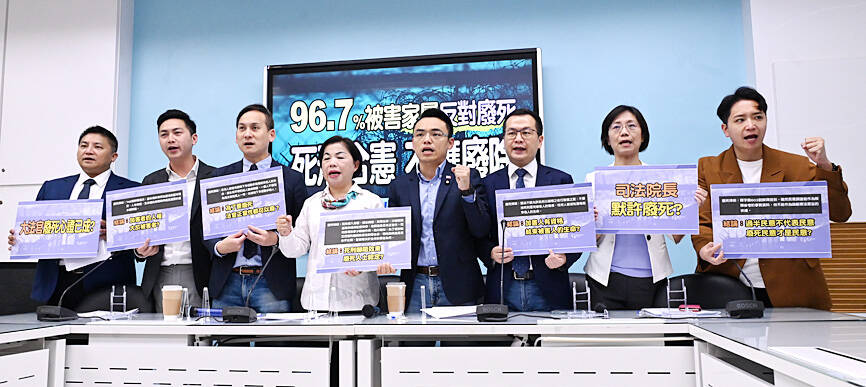Democratic Progressive Party (DPP) and Chinese Nationalist Party (KMT) lawmakers yesterday clashed over the death penalty a day after the Constitutional Court heard oral arguments about its constitutionality.
The Constitutional Court is reviewing a case to abolish capital punishment brought by 37 inmates on death row.
The KMT legislative caucus yesterday held a news conference at the Legislative Yuan, with caucus secretary-general Hung Mong-kai (洪孟楷) leading lawmakers in chanting: “The death penalty is constitutional, it should not be abolished.”

Photo: Liu Hsin-de, Taipei Times
During the debate at the Constitutional Court, one justice asked why judges are expected to bend to popular opinion, Hung said.
KMT Legislator Lo Chih-chiang (羅智強) said the justice’s comment suggests that their mind is already made up, which is improper in a case that is still being deliberated.
Use of the death penalty falls under the legislature’s purview and is a matter that should be decided by public opinion, he said, adding: “If the justices have the gumption, they are free to jump off the bench and try to get elected as a lawmaker.”
Lo’s campaign platform included his opposition to abolishing the death penalty, and election results proved that the public agrees with his stance, he said.
KMT Legislator Yang Chiung-ying (楊瓊瓔) said the former council of grand justices consistently upheld the death penalty and its rulings are binding, citing Constitutional Interpretations No. 194, No. 263 and No. 276.
KMT Legislator Weng Hsiao-ling (翁曉玲) said that if the court made the wrong judgement, it would cause irreparable damage to society and faith in morality and justice, adding that the court should respect the majority opinion and the legislature’s prerogative.
Asked to comment, DPP legislative caucus secretary-general Rosalia Wu (吳思瑤) told a routine news briefing that her party emphasizes respect for the spirit of the Constitution and the Constitutional Court’s proceedings.
The DPP legislative caucus has no doubt in the justices’ ability to navigate this highly divisive issue, and make an appropriate judgement based on the law and social consensus, she said.

The Ministry of Economic Affairs has fined Taobao NT$1.2 million (US$36,912) for advertisements that exceed its approved business scope, requiring the Chinese e-commerce platform to make corrections in the first half of this year or its license may be revoked. Lawmakers have called for stricter enforcement of Chinese e-commerce platforms and measures to prevent China from laundering its goods through Taiwan in response to US President Donald Trump’s heavy tariffs on China. The Legislative Yuan’s Finance Committee met today to discuss policies to prevent China from dumping goods in Taiwan, inviting government agencies to report. Democratic Progressive Party Legislator Kuo Kuo-wen (郭國文) said

The Ministry of Economic Affairs has fined Taobao NT$1.2 million (US$36,900) for advertisements that exceeded its approved business scope and ordered the Chinese e-commerce platform to make corrections in the first half of this year or its license would be revoked. Lawmakers have called for stricter supervision of Chinese e-commerce platforms and more stringent measures to prevent China from laundering its goods through Taiwan as US President Donald Trump’s administration cracks down on origin laundering. The legislature’s Finance Committee yesterday met to discuss policies to prevent China from dumping goods in Taiwan, inviting government agencies to report on the matter. Democratic Progressive Party

Taiwan and its Pacific ally Tuvalu on Tuesday signed two accords aimed at facilitating bilateral cooperation on labor affairs, according to Taiwan’s Ministry of Foreign Affairs (MOFA). The governments inked two agreements in Taipei, witnessed by Foreign Minister Lin Chia-lung (林佳龍) and visiting Deputy Tuvaluan Prime Minister Panapasi Nelesone, MOFA said in a news release. According to MOFA, the agreements will facilitate cooperation on labor issues and allow the two sides to mutually recognize seafarers’ certificates and related training. Taiwan would also continue to collaborate with Tuvalu across various fields to promote economic prosperity as well as the well-being of their

Sung Chien-liang (宋建樑), who led efforts to recall Democratic Progressive Party (DPP) Legislator Lee Kun-cheng (李坤城), was released on bail of NT$80,000 today amid outcry over his decision to wear a Nazi armband to questioning the night before. Sung arrived at the New Taipei District Prosecutors’ Office for questioning in a recall petition forgery case last night wearing a red armband bearing a swastika, carrying a copy of Adolf Hitler’s Mein Kampf and giving a Nazi salute. Sung left the building at 1:15am without the armband and covering the book with his coat. Lee said today that this is a serious